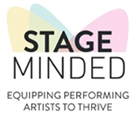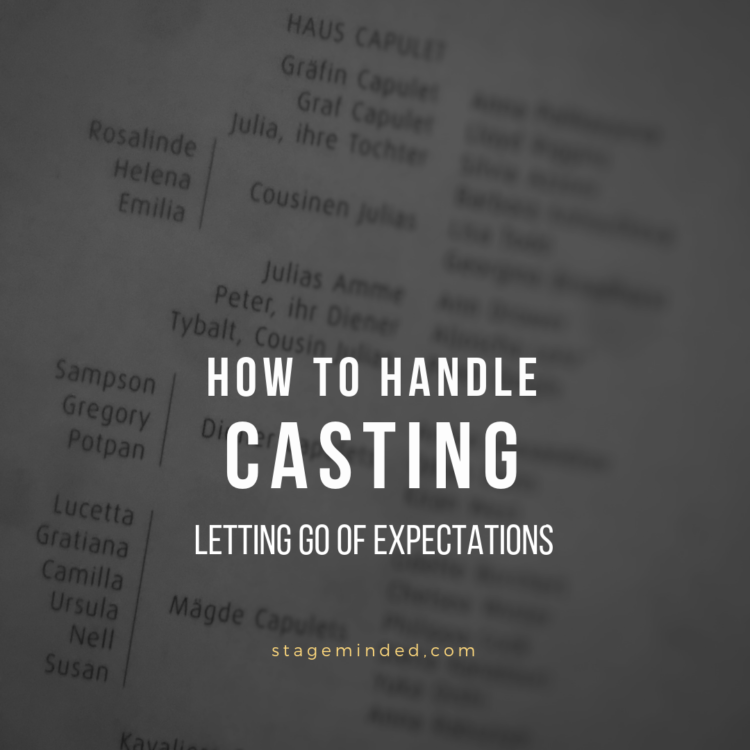How To Handle Casting: Letting Go Of Expectations
CYou’ve worked so hard, and feel that this role you’ve been striving for, could be your platform for bigger and better opportunities. Except that your experience of casting day has often lead to disappointment.
A flurry of questions cloud your mind as you step up to the cast list to reveal your future.
Possibly the loudest question of all is, “what if I don’t get the part?”
But what if we asked ourselves a new question?
“How will I use this experience to improve as a performer?”
There’s no doubt casting days are emotionally charged times in your career as a performer. It can be difficult to see things objectively when you’re feeling a range of strong emotions all at once.
Just reading the first question makes me feel anxious. How about you? There is so much expectation that this part will be the answer, that if you get the part, you can be happy, if you don’t you will be unhappy.
Shall we talk for a moment about expectations?
Expectations are a way of framing your desired outcome and putting all of your hopes for happiness in this one image. Rest assured you’re not alone, as humans we’re formulating expectations all the time, about even the smallest things.
You may look forward to a cup of coffee in the morning and find when this expectation is met, you feel like you’ve had a win. Your day has started well, you feel happy.
We all strive to be happy in some capacity, right?
But what happens when things turn out differently to how you expected them to?
Naturally, we feel disappointment. Particularly when our expectations involve other people. Which is why casting day can stir up so many emotions. Expecting another person to do something you want them to, such as choosing you for the role you think will help further your performance career, can leave you open to compromising your self-confidence.
Casting sometimes is fate and destiny more than skill and talent, from a Director’s point of view.
Steven Spielberg
The expectations we formulate which involve others can be described as a form of magical thinking. You’ve put a kind of ‘rule’ in place, so when someone doesn’t follow your rule (even though they aren’t necessarily aware of this expectation), you feel let down.
Of course, in many cases you need to expect to be treated fairly, that’s reasonable. There are many different ways you communicate how you expect to be treated by others, without even really knowing it. So it’s not to say expectations are wrong in any way, it’s just that sometimes our response to them causes us to become stuck.
Take a minute or two to reflect now…
Remember that striving for the role you wanted gave you motivation to improve your performance skills. Even though things turned out differently, try focusing on how far you’ve come.
Many performers fall into a trap of using cast lists as a way of measuring their ability as a and sometimes even their sense of value as a person. Because the new outcome is different to your expectations, you may feel easily deflated.
On the other end of the spectrum, you may find yourself, developing negative expectations as a way of coping with the pitfalls of the performance industry.
So even when the outcome is more positive than what you may have thought, your focus could be negating the belief you have in yourself to carry out the role.
Either way, with expectation, you’ve put a lot of your energy into focusing on the outcome.
Can you remember some of the aspects of a Growth Mindset?
It’s much more effective to reframe the expected image and move forward by focussing on the process.
Ask yourself again;
“How will I use this experience to improve as a performer?”
This is where you can begin adjusting some of your belief systems around the roles you’ve been cast in and reformulating your identity as a performer.
When you begin to see your potential for growth, you’ve planted a seed, just like Jack’s Beanstalk, and this is where the real magic happens.
Peace is the result of retraining your mind to process life as it is, rather than how you think it should be.
Wayne Dyer
You’re so much better off measuring your progress by looking at things like:
- The consistency of your effort
- How effectively you’ve been applying corrections and other learning strategies
- The ways your performance is improving and your kinaesthetic awareness is growing
- Your growing ability to manage challenges as a performer
The really good news is, each time you participate in a production, regardless of your role, or whether you are understudying, you have the opportunity to practice and refine important industry skills such as learning to:
- Put yourself forward confidently
- Pick up choreography quickly and/or co-create choreography
- Apply mood and characterisation
- Adapt to changes and be reliable
- Work well with others
- Stay in formations and lines
So instead of those expectations spinning in your mind, making you dizzy with resentment and frustration, you have an opportunity to focus on the things you can control, and to enjoy your performance.
There are things I can’t force. I must adjust. There are times when the greatest of change needed, is a change of my point of view
Denis Diderot

